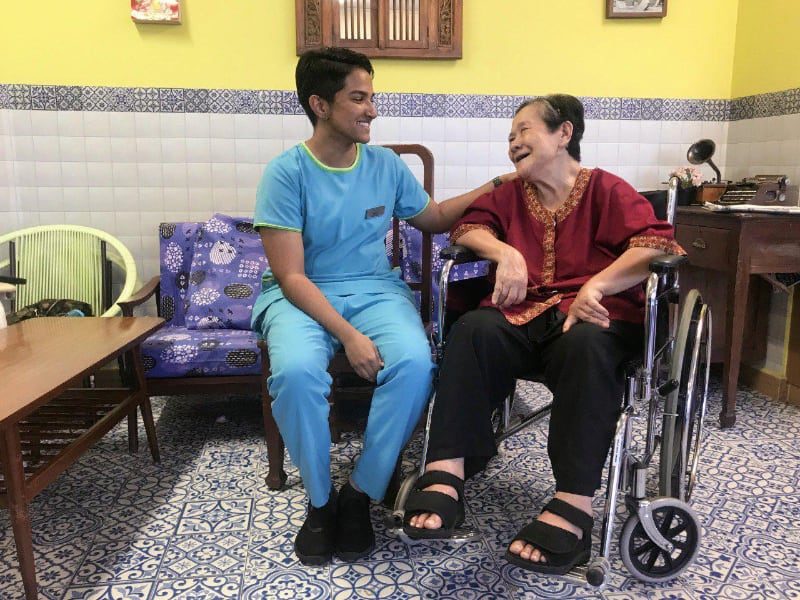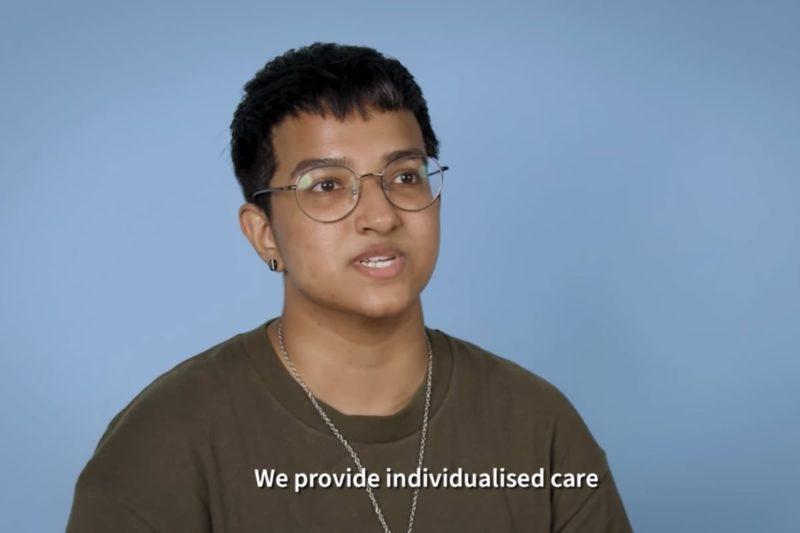What does it mean to be a Community Care worker? Smitha Pillai, a 27-year-old Enrolled Nurse at NTUC Health’s Nursing Home(Jurong West), shares her experience in this essential yet often-overlooked job.

Smitha was one of four individuals featured in a Can Ask Meh? video by Our Grandfather Story, which unpacked the core jobs of Community Care professionals.
Together, they debunked misconceptions and addressed assumptions that the general Singapore population might hold about this line of work.
“People have this image that we don’t do anything, that we are sitting down and shaking our legs. But that’s far from the truth.”
In actual fact, the Community Care sector is comprised of a variety of clinical and non-clinical roles, from therapists and administrative staff, to nurses and medical social workers. These professionals work hard at attending to client needs, implementing care plans or giving rehabilitative treatment, and their job also extends to caring for the psychosocial needs of those they serve.
Nurses at NTUC Health’s three nursing homes, like Smitha, are specifically focused on providing individualised care. The main objective: treating and caring for every resident as if they are loved ones.
Putting herself in the residents’ shoes has helped Smitha develop a patient and nurturing disposition as she looks out for areas to improve on beyond medical care, such as their comfort and emotional wellbeing.
Another key area of Smitha’s job is building rapport and being a companion to residents she cares for. This creates an environment where they can feel happy and comfortable, emotions that are crucial for nurses to gain insight into unspoken needs. Understanding the residents is a big part of providing the best care for them. However, this process may not always be as straightforward as one might think.
In the video, Smitha shared a story about a resident who was challenging to care for because of his aggressive behaviour. As he was often cursing and throwing food at staff, it made it difficult for them to connect with him. Despite the upsetting circumstance, Smitha took the extra step to understand the source of his aggression and reach out to him.
She discovered that he was a firefighter, frustrated about the loss of his independence after suffering a stroke. Looking at the situation from his perspective helped Smitha understand his emotions and mental state. After some time, he opened up to her, and Smitha surmised that this breakthrough in their connection stemmed from the resident recognising her effort in trying to understand him.
Working in the Community Care sector has certainly been a tiring and emotionally-demanding experience, but Smitha has found moments of joy and success in building relationships with the residents.
Said Smitha in a related RICE Media article:

“There’s a certain kind of joy you get from interacting with seniors. When you see an old auntie smile at you, it’s so genuine.”
There has been much to learn from the residents in the nursing home, and Smitha has found that adopting their optimistic outlook helps her push forward both in work and life. Now pursuing a Diploma in Nursing at Ngee Ann Polytechnic, she hopes to further her career in the Community Care sector.
Leaving her workplace for studies was an emotional decision, especially when residents expressed sadness as they bid her farewell – but Smitha looks forward to her return.
“Hopefully when I’m back, those residents are still there and I can continue caring for them.”
Supporting seniors in their silver years may sound like a formidable task, but Community Care professionals like Smitha and others see great importance in the work they do. Be it providing companionship, empowering the seniors to age gracefully or relieving caregiver pressure, they believe their efforts have long-lasting positive effects on individuals, their families, and the wider community.
Kudos to all community care professionals for their tireless efforts and hearts of gold.
Get in touch with us
Looking for an exciting career at NTUC Health? Visit our careers page for more!

